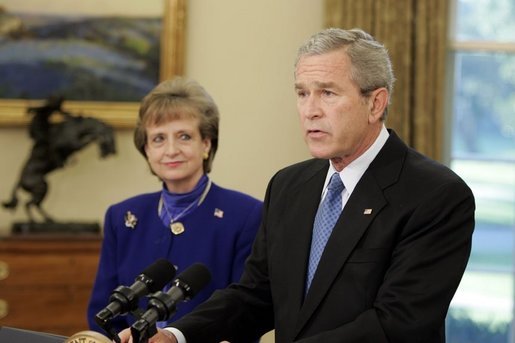
Harriet Miers Supreme Court nomination
On October 3, 2005, Harriet Miers was nominated for Associate Justice of the U.S. Supreme Court by President George W. Bush to replace retired Associate Justice Sandra Day O'Connor. Miers was, at the time, White House Counsel, and had previously served in several roles both during Bush's tenure as Governor of Texas and President.
Harriet Miers Supreme Court nomination
George W. Bush (president of the United States)
October 3, 2005
October 27, 2005
Nomination withdrawn
Miers's nomination was negatively received across the political spectrum, with critics charging that she did not have enough judicial experience to sit on the court. Conservative commentator David Frum castigated the selection as an "unforced error",[1] and Robert Bork (himself a failed Supreme Court nominee) denounced it a "disaster" and "a slap in the face to the conservatives who've been building up a conservative legal movement for the last 20 years."[2] Hearings before the United States Senate Judiciary Committee had been scheduled to begin on November 7, and members of the Republican leadership had stated before the nomination that they aimed to have the nominee confirmed before Thanksgiving (November 24). Miers withdrew her nomination on October 27, 2005, and Bush nominated Samuel Alito four days later.
Withdrawal[edit]
President George W. Bush withdrew his nomination of Harriet Miers shortly after an awkward dispute she had with Senator Arlen Specter of Pennsylvania, then the Republican chairman of the Senate Judiciary Committee. At issue was what she had said during their private talk about the right to privacy, an underpinning of the high court's 1973 Roe v. Wade decision establishing abortion rights.[18]
Bush stated that Miers asked to withdraw her nomination on October 27, 2005, and he acceded to her wishes.[43] The narrative where Miers jumped rather than being pushed was accepted at first, but has since been challenged. Most prominently, Jan Crawford Greenburg reported that Miers' abysmal performance in murder boards before the hearings made clear to White House Chief of Staff Andy Card and Deputy White House Counsel William K. Kelley that the game was up, at which point, they demanded Miers withdraw. After initial resistance, she acquiesced.[44]
Bush and Miers attributed her withdrawal to requests from the Judiciary Committee for the release of internal White House documents that the administration had insisted were protected by executive privilege. Both Republican and Democratic senators denied that they were attempting to obtain privileged documents.[45] Most observers instead believed this rationale was a way for the Bush administration to pull her nomination and still "save face," by avoiding a direct acknowledgment of the lack of support for her nomination. The claim of executive privilege had been publicly recommended as an "exit strategy" by commentators such as Charles Krauthammer,[46] and reports indicated that White House advisors had considered that as a tactic.[47]
Samuel Alito, a federal judge on the U.S. Court of Appeals for the Third Circuit, was nominated four days after her withdrawal and subsequently confirmed.